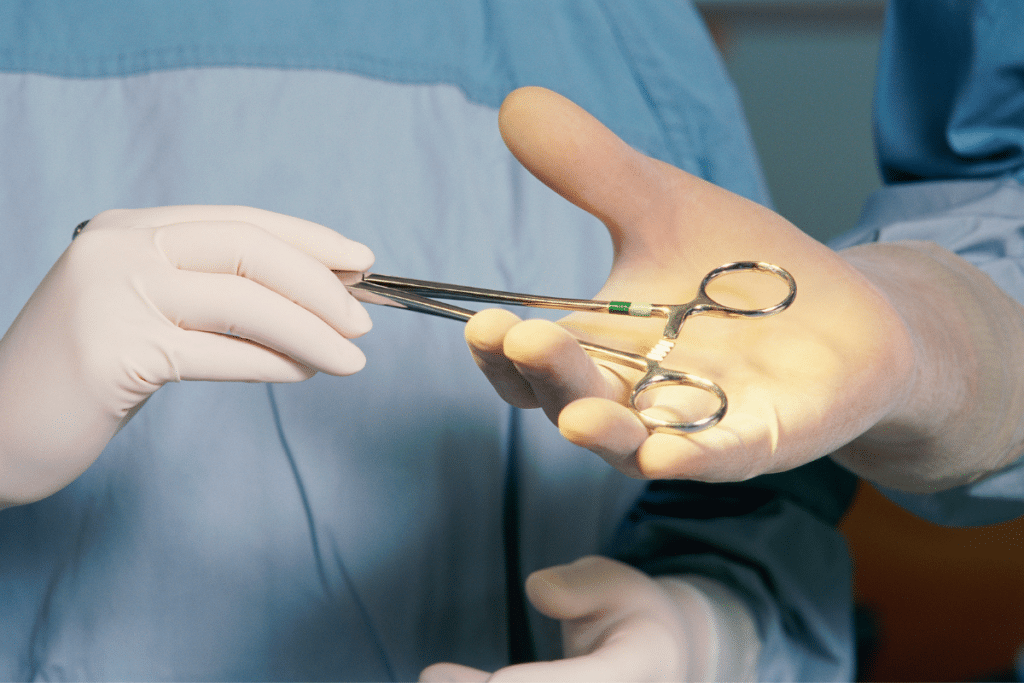Florida Surgical Error Attorneys
You trust doctors and surgeons to take good care of you when you undergo surgery. You expect to be taken care of by these medical professionals. But when negligent doctors and surgeons cause you harm, it can have devastating consequences on your health.

FREE CASE REVIEW
Home > Florida Personal Injury Lawyer > Florida Medical Malpractice Attorneys > Florida Surgical Error Attorneys
According to a recent study by Coverys, 25% of medical malpractice claims over five years cited surgical error allegations. Overall, surgical errors are the second leading cause of medical malpractice suits.
At Farah & Farah, our experienced medical malpractice attorneys throughout Florida have a track record for collecting compensation for our clients. If you or a loved one has been injured due to a surgical error and medical negligence, you deserve justice. Contact the surgical error experts at Farah & Farah for a free consultation.

What Is A Surgical Error?
All surgeries come with some element of risk. Before a surgery your doctor will discuss these risks with you and have you sign an informed consent form to confirm that you understand and accept these risks. However, surgical errors are unexpected events that go beyond the usual risks of surgery.
A surgical error can include common medical mistakes like misplacing tools or making incorrect incisions, but can also include incorrect diagnoses. Though many surgical error cases are built on case precedent, each person’s circumstances are unique. Whatever your situation is, Farah & Farah’s experienced surgical error lawyers are ready to help you seek the justice you deserve.
What Causes Surgical Errors to Happen?
While every person’s situation is different, there are some common reasons why surgical errors occur. These include:
Incompetence
While we trust our medical practitioners to take good care of us, some surgeons may be inexperienced in a particular procedure and therefore lack the skill and precision required to execute the surgery.
Insufficient Preoperative Planning
A surgeon must be well organized and prepared for surgery. They should review and prepare for any complications that may arise during the procedure. In addition, nurses and assistants should also ensure that all necessary resources and equipment are readily available for use during the procedure.
Improper Work Process
Surgeons need to execute precise steps during a procedure to make sure that it goes smoothly. If a surgeon takes shortcuts or deems some of these steps unnecessary, it may be catastrophic for the patient.
Poor Communication
A failure to properly communicate particular needs for a procedure can lead to serious consequences. Communication failures may include marking the wrong surgery site, failing to make sure all equipment is on hand, or giving a patient the wrong dosage of medication.
Fatigue
Surgeons often work long shifts and may become fatigued. Without proper rest, people are generally more likely to make mistakes. If your surgeon makes a mistake due to fatigue, it can cause serious health issues for the patient.
Drugs/Alcohol
Being a surgeon can be a demanding and stressful job, and some may turn to drugs and alcohol as a result. While it may be shocking to imagine, a surgeon may perform a procedure under the influence and make a devastating mistake.
Neglect
We expect our surgeons to take good care of us during surgery, but some surgeons may not be as careful as they should be. This negligence may include improper sterilization or use of defective medical tools, leading to harmful consequences for the patient.
If you or a loved one has been harmed by a preventable surgical error, contact the medical malpractice experts at Farah & Farah for a free consultation.
$2+ BILLION IN RESULTS

Common Types of Surgical Errors
There are many kinds of surgical errors and they vary between different procedures and situations. Here are some of the most common types of surgical errors.
Wrong Site Surgery
Wrong site surgery occurs when a procedure is performed on the wrong part of the body. This has serious consequences for the patient, such as amputating the wrong limb.
Wrong Patient/Unnecessary Surgery
While more unusual than wrong site surgery, some doctors may recommend an unnecessary procedure. Sometimes a patient receives a surgery meant for a different patient. Surgical complications from unneeded surgery can cause lasting harm to the patient.
Infection
The use of improperly sanitized medical tools during surgery may cause disease. As a result, patients with compromised immune systems may get sick and suffer dire consequences.
Surgical Instruments Left in Body
In some cases, medical tools may be left inside the body after the surgeon sutures the surgery site. Some hospitals require that surgical instruments, gauze, or sponges are counted before and after surgery to prevent this from happening. However, this is not the case in all situations, and severe complications and infection may occur due to this negligence.
Damage to Internal Organs
Organ tissue is delicate and should be treated with care. However, some surgeons may accidentally damage surrounding tissues, causing long-lasting and serious health issues for the patient.
Nerve Damage
Nerves are sensitive organs and can be easily damaged. A surgeon may accidentally make a physical error with a medical tool, or an anesthesiologist may improperly administer anesthesia. This causes nerve damage and devastating consequences.

Suing for Surgical Errors
Most medical facilities have developed detailed standards of care to ensure they follow every precaution. Some have implemented focused patient briefing sessions, assigned advocates, and even the surgeon’s initials on the patient’s surgical site. However, even with these safeguards in place, mistakes can happen, and some degree of error is expected.
Every state follows a unique statute of limitations for filing a medical malpractice claim. A statute of limitations is a legal time limit for filing a lawsuit. It is best to start your claim before the deadline. Otherwise, you risk forfeiting your legal rights.
Medical malpractice and surgical error suits are subject to high legal standards, which vary from state to state. These standards require evidence that the surgical injury could have been avoided with proper care measures, and that the surgeon in question must have failed to follow these care measures.
Depending on the severity of the surgical error, you may be entitled to recover damages for medical malpractice, including current and future lost wages, medical bills, pain and suffering, disability, therapy, living or transportation expenses, and/or loss of consortium.
Get Help From a Surgical Error Lawyer
A surgical error can be a nightmare. Not only are you recovering from your surgery, but you are also healing from your medical professional’s mistake. Meanwhile you may also be dealing with mounting bills and getting the runaround from the medical insurers. You deserve answers. A skilled attorney can help you navigate the challenging process of filing your claim and fight for results. You owe it to yourself to hire an experienced lawyer.
At Farah & Farah, we understand the devastating effects that surgical errors can have on you and your family. We will help you pursue justice for your injuries. Contact Farah & Farah now for your free, no-obligation consultation.














FREE CASE REVIEW
